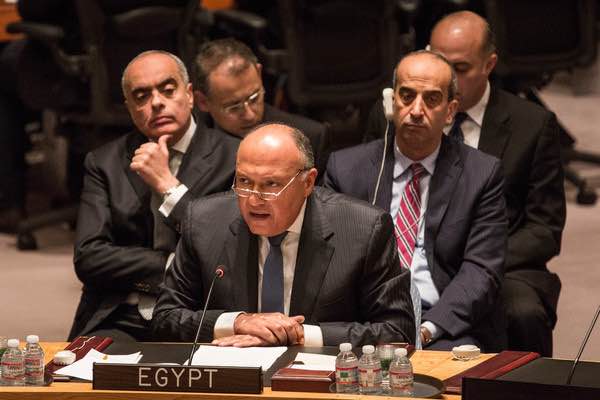Minister of Foreign Affairs Sameh Shoukry denounced Wednesday a report by Amnesty International about Egypt that calls on EU member states to halt arms transfers to Egypt “to stop fuelling killings and torture”.
During a press conference with his Canadian counterpart, Stéphane Dion, Shoukry answered a question on the report saying that the organisation’s reports are “always exaggerated and based on false information”.
Amnesty International released a report on Wednesday saying: “almost half of EU member states have flouted an EU-wide suspension on arms transfers to Egypt, risking complicity in a wave of unlawful killings, enforced disappearances, and torture.”
The report added that: “Egyptian forces are carrying out enforced disappearances, torture, and arbitrary arrests on a mass scale and EU states that transfer arms and policing equipment to Egypt are acting recklessly and risk complicity in these serious violations.”
Shoukry said that the arms delivered to Egypt are being used to fight terrorism and help stabilise the Egyptian state.
“Almost three years after the mass killings that led the EU to call on its member states to halt arms transfers to Egypt, the human rights situation has actually deteriorated,” the interim deputy Middle East and North Africa Programme director at Amnesty International was quoted as saying in the report.
Out of 28 EU member states, 12 have remained among Egypt’s main suppliers of arms and policing equipment, according to the international rights watchdog. Amnesty fears the EU foreign ministers could soon decide to scrap the “already insufficient” suspension.
According to Amnesty, in 2014 alone, EU states authorised 290 licences for military equipment to Egypt, totalling more than €6bn ($6.77bn). The items have included: small arms, light weapons, and ammunition; armoured vehicles; military helicopters; heavier weapons for use in counter-terrorism and military operations; and surveillance technology.
Since the ouster of the Muslim Brotherhood government in 2013, the Foreign Ministry has been diminishing the reliability of reports released by international right organisations such as Amnesty International and Human Rights Watch (HRW).
Ministry officials and statements have directed accusations against international rights reports concerning Egypt that range from being misrepresentative to “full of lies”.
The Amnesty International report called on EU member states to impose a binding embargo on transfers of security and policing equipment to Egypt of the types of arms used to commit or facilitate serious violations of human rights. It also called for imposing a “presumption of denial policy” on transfers of arms intended for use by the Egyptian Armed Forces and Air Force on the back of reports that aerial attacks which resulted in fatalities and serious injuries have not been justly investigated.
A final recommendation to the EU member states was to maintain the embargo and the presumption policy until the Egyptian authorities put in place effective safeguards to prevent further “serious violations” by security forces and carry out impartial investigations into violations since the 2011 uprising.

